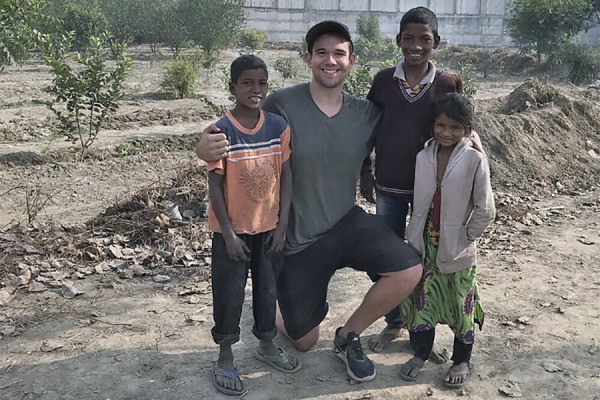 UWindsor student Dylan Verburg was often greeted by youngsters Kishan, Guddu, and Maya during his trips to a lake outside the Indian capital city of New Delhi, where he was conducting his master’s research on water quality.
UWindsor student Dylan Verburg was often greeted by youngsters Kishan, Guddu, and Maya during his trips to a lake outside the Indian capital city of New Delhi, where he was conducting his master’s research on water quality.
On his daily walk over to a sewage contaminated lake in India where he was conducting his master’s research on water quality, Dylan Verburg would be greeted by three familiar faces.
They didn’t speak English, but the siblings who lived on the same compound would smile as they followed Verburg around, proudly show him their cartwheel skills and even volunteered to row a boat for him while he worked on implementing a water treatment system in the lake they lived by. The encounters were quickly becoming the highlight of Verburg’s five-month stint contributing to an international research project funded by the India-Canada Centre for Innovative Multidisciplinary Partnerships to Accelerate Community Transformation and Sustainability (IC-impacts).
“I have always loved being around kids and quickly built a connection with them,” the environmental engineering graduate student says about his recently orphaned friends, Guddu, 14, Kishan, 9, and Maya, 8, who also happen to be undocumented citizens. “But it really hurt knowing that these little ones weren’t getting an education and the future for illiterate individuals in India isn’t promising.”
So Verburg decided to help the children access more than just clean drinking water. With the support of UWindsor’s EPICentre, the WEtech Alliance, and Libro Credit Union, Verburg and a friend he made while living in India founded INpact Collective, a social enterprise aimed at importing artisan products from India to sell in Canada.
With the profits, the two plan on enrolling Guddu, Kishan, and Maya in the next session of school as well as children from two other families. They’re also using profits to stock a school supply bank and assist Pehchaan — a school run by 45 volunteers on a street corner for whomever wants to learn.
“This instance is far from an isolated occurrence,” says founding partner and Indian resident Aditi. “Sadly, the streets of Delhi and much of India are full of children with similar stories — unable to go to school and be afforded the basic human right of education.”
The Canada South Chapter of the Association of Fundraising Professionals will confer its Outstanding Youth in Philanthropy award on Verburg during its November 14 celebration of National Philanthropy Day. The award is given annually to an individual between the ages of five and 25, who demonstrates outstanding commitment to the community through direct financial support, the development of charitable programs, volunteering and leadership in philanthropy.
Verburg said there are many difficulties involved in trying to register undocumented citizens in school. The Government of India has rolled out various aids and programs to help those in need, but there’s still a gap, he adds. When he discovered the cost of sending the children to school was quite reasonable, he knew he had to help.
“We hope to be part of the change that helps bring the right of education to the forgotten members of society and drive social change,” he says.
He hopes to see these children become active members of society who pay it forward. Some of the products INpact Collective imports include Himalayan shawls (sheep wool, yak wool and rabbit fur), pashminas, leather bags and décor. To learn more, visit inpact.ca.
Verburg created a blog to document the successes and obstacles experienced throughout his work on the project and to share stories about the people he met while immersing himself in a new culture. His blog is posted at uwindsor.ca/engineering/dylan-verburg.
An article about Verburg’s water quality research ran in the June 2018 issue of The Voice, a magazine produced by the Ontario Society of Professional Engineers.
—Kristie Pearce
